The Substance Use Policy Evaluation and Research (SUPER) workgroup is an interdisciplinary, interinstitutional research team of faculty and students led by Barbara “Basia” Andraka-Christou. The research team employs qualitative, quantitative, and mixed method approaches to address complex research questions about health services and policies in the justice system. Much of their work explores use of medications for opioid use disorder and the problem-solving court setting.
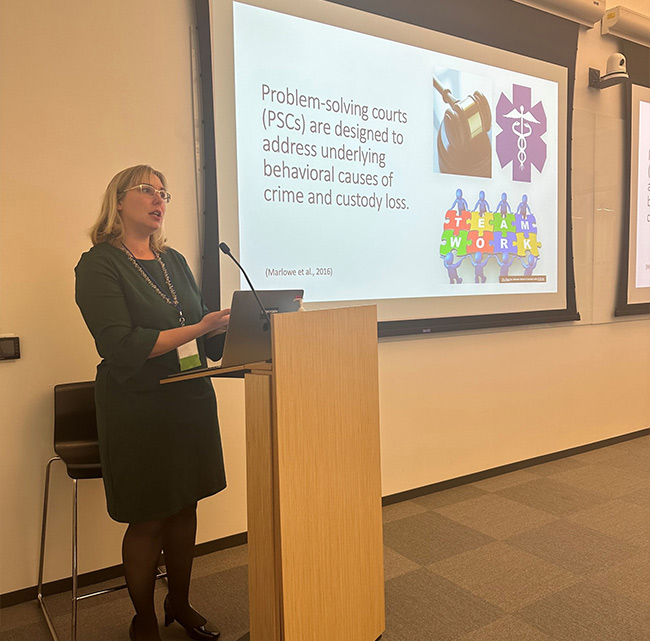
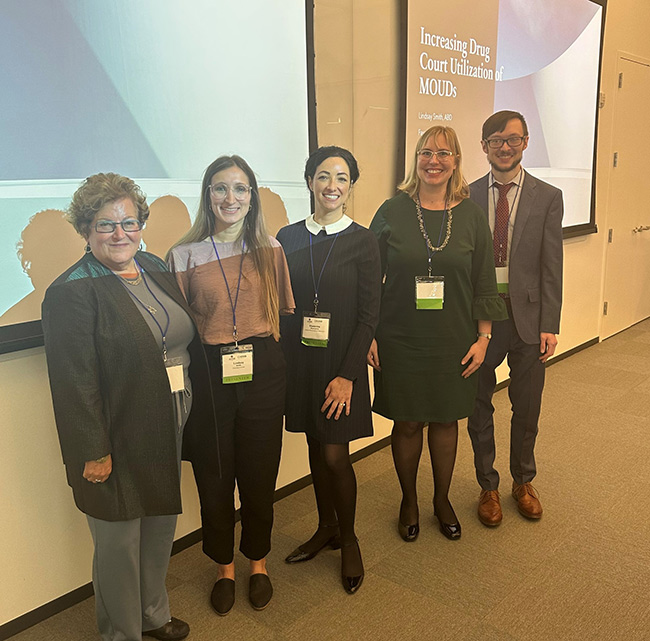
Our Team
The Substance Use Policy Evaluation and Research Workgroup includes interdisciplinary faculty and graduate students with expertise in substance use disorder health services and policy, mental health services, qualitative methods, quantitative methods and mixed methods. Our goal is to help organizations (for example, government agencies, judges, court staff and clients) use evidence-based practices for substance use disorder treatment, including for opioid use disorder.-
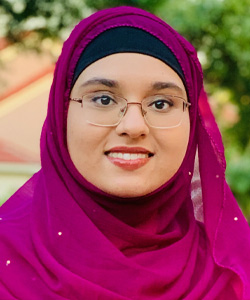
Fatema Ahmed, Ph.D., MHA
Postdoctoral Scholar -
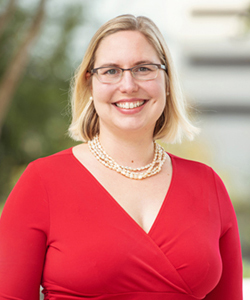
Barbara Andraka-Christou, Ph.D., J.D.
Associate Professor -
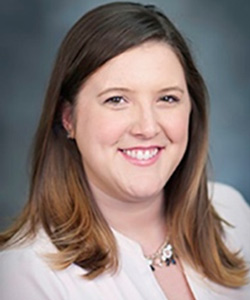
Danielle Atkins,Ph.D.
Associate Professor -

M.H. Clark, Ph.D.
Associate Lecturer -
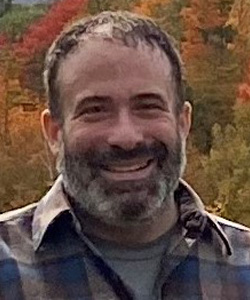
Brandon del Pozo, Ph.D.
Co-Investigator -
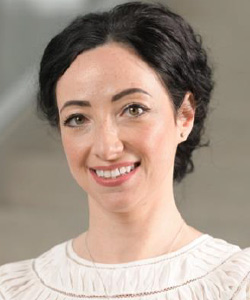
Ekaterina Pivovarova, Ph.D.
Assistant Professor -

Joy Schiedell, Ph.D., MPH
Assistant Professor -

Suhas Shewale, Ph.D.
Postdoctoral Scholar -
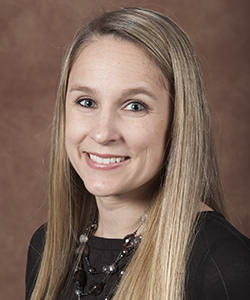
Jill Viglione, Ph.D.
Associate Professor
Current Projects
Moud Decision-Making (JRIG)
We are funded by a grant from the Justice Community Opioid Innovation Network (JCOIN), a National Institutes of Health HEAL Initiative, to accomplish two aims: 1) to describe courts’ case-by-case decision-making processes regarding medications for opioid use disorder; and 2) to identify factors involved in court team decisions about medications for opioid use disorder. This is a sequential exploratory mixed methods project, with data collection starting in April 2022. Our project is informed by Lipsky’s street-level bureaucracy framework.
Selected Presentations
Identifying MOUD Decision-Making Factors in Criminal Problem-Solving Courts
Oral presentation at: Annual Association for Public Policy Analysis & management; November 17, 2022; Washington D.C.
Court staff perceptions of “trustworthy” Providers of medications for opioid use disorder annual conference
Oral presentation at: Annual Academic Consortium on Criminal Justice Health; April 6, 2022; Hollywood, FL.
Examining MOUD Decision-Making Factors in Problem-Solving Courts.
Virtual presentation at: JCOIN Steering Committee Meeting; National Institute on Drug Abuse, National Institutes of Health. April 20, 2022.
Mixed method study of collaborations between problem-solving court staff and community providers of medications for opioid use disorder.
Presentation at NIH Justice Community Opioid Innovation Network Steering Committee Annual Meeting. June 12, 2024; Baltimore, MA.
Peer Reviewed Publications
Factors affecting problem-solving court team decisions about medications for opioid use disorder.
Authors: Barbara Andraka-Christou, Jill Viglione, Fatema Z. Ahmed, Brandon Del Pozo, Danielle N. Atkins, M. H. Clark, Rachel Totaram, and Ekaterina Pivovarova.
Source: Journal of Substance Use and Addiction Treatment. 2025;168(209525).
Evaluation of the Florida Opioid Initiative
Our workgroup has been the primary research arm for the Florida Courts Opioid Initiative, led by the Office of the State Courts Administrator. We have conducted statewide surveys of court staff beliefs, social norms, perceptions of self-efficacy and policies related to medications for opioid use disorder. The research approach is based on the theory of reasoned action and planned behavior. We have also examined the relationship between training about medications for opioid use disorder and beliefs.
Drug Court Evaluation
We are evaluating a three-year, $1.5 million grant funded by the Bureau of Justice Administration and awarded to the Florida Office of the State Courts Administrator. The project evaluation involves examining the implementation process, implementation outcomes, and health service outcomes of evidence-based substance use disorder treatment, parenting engagement interventions, and cultural competency practices in five family dependency drug courts across the state of Florida. Our research is guided by the Exploration, Preparation, Implementation & Sustainment (EPIS) Framework and the Centers for Disease Control & Prevention standards for program evaluation.
Peer Reviewed Publications
Barriers to medications for opioid use disorder in the court system: provider availability, provider “trustworthiness” and cost.
Authors: Fatema Ahmed , Barbara Andraka-Christou, MH Clark, Rachel Totaram, Danielle Atkins , Brandon del Pozo.
Source: Health Justice. 2022;10(24). DOI
Impact of COVID-19 on Florida family dependency drug courts. Authors: Olivia K.Golan, Fatema Z. Ahmed, Barbara Andraka-Christou, Rachel Totaram, Yara Asi, and Danielle Atkins.
Source: Health Justice. 2024;12: 4. DOI
Selected Presentations
Implementation of peer support specialists in Florida family dependency drug courts.
Oral presentation at: 16th Annual Academuc Health and Policy Conference on Correctional Health; April 13, 2023; Raleigh NC.
Family dependency drug court service modifications during COVID-19.
Poster presented at: American Society of Addiction Medicine annual conference; April 1, 2022; Hollywood, FL.
Barriers and Facilitators of Implementation of Evidence-based Practices in Five Florida Family Dependency Drug Courts.
Poster presented at: UCF Annual Public Administration Research Conference; March 21, 2021; Orlando, FL
Family dependency drug court service modifications during COVID-19.
Invited virtual presentation to the Florida Supreme Court Office of the State Courts Administrator; March 24, 2022.
Other Presentations
Authors: Fatema Z. Ahmed, Barbara Andraka-Christou, Danielle Atkins, M.H. Clark, Rachel Totaram, Brandon del Pozo, Ekaterina Pivovarova.
Virtual Court Services
Through a collaboration with Wayne State University, we sought to understand court staff perceptions of virtual versus in-person court services using surveys. Specific aims include comparing perceptions of client attendance and engagement in virtual hearings versus in-person hearings.
Peer Reviewed Publications
A National Survey of Problem-Solving Court Staff Perceptions of In-Person versus Virtual Hearings.
Authors: Barbara Andraka-Christou, Danielle D. Atkins, M. H. Clark, Brandon Del Pozo, and Bradley Ray
Source: American Academy of Psychiatry and the Law. 2024;52(1):15-22. DOI
Designing Interactive Education about Medication for Opioid Use Disorder for Judges and Court Staff
In collaboration with the Office of the State Courts Administrator and software vendor Enfoglobe LLC, our research team has assisted with the design of educational modules about medications for opioid use disorder (MOUD), targeting judges and court staff in Florida. These modules offer a variety of interactive quizzes, animations, and videos, as well as information and resources to assist and engage judges, court staff and stakeholders in the field.
Access to the portal with interactive tools is freely available to Florida judges, court staff, and interested stakeholders.
Peer Reviewed Publications
Problem-Solving Court Staff Preferences for Educational Videos about Medications for Opioid Use Disorder.
Authors: Barbara Andraka-Christou, Yara M. Asi, Rachel Totaram, and Harlan Matusow
Source: Substance Use and Misuse. 2023. DOI
Overdose Trends
In collaboration with Wayne State University, we are examining trends in opioid-involved deaths, as well as racial disparities in overdose calls to emergency medical services.
Peer Reviewed Publications
Disparities in the accuracy of reporting opioid overdoses to 9-1-1 by race and sex of overdose victim, Marion County, Indiana, 2011–2020.
Authors: Danielle N. Atkins, Brandon Del Pozo, M. H. Clark, Barbara Andraka-Christou, Daniel O’Donnell, and Bradley Ray
Source: Health Justice. 2024;12: 25. DOI
Court Medical Marijuana Policies
Our JCOIN LEAP Investigator funded project will use a sequential exploratory mixed method study to examine Florida dependency court staff policies and attitudes toward medical marijuana.
Selected Presentations
Medical marijuana policies and practices in Florida family treatment courts.
Oral presentation at Rise24: The National Annual Conference of All Rise (the National Association of Drug Court Professionals). May 23, 2024; Anaheim, CA.
Police Projects
We are examining attitudes of police toward harm reduction measures, as well as barriers to police-initiated treatment referrals for opioid use disorder, with an emphasis on evidence-based alternatives to arrest.
Peer Reviewed Publications
Police Discretion in Encounters with People Who Use Drugs: Operationalizing the Theory of Planned Behavior
Authors: Brandon del Pozo, Emily Sightes, Jeremiah Goulka, Brad Ray, Claire A. Wood, Saad Siddiqui, and Leo A. Beletsky.
Source: Harm Reduction Journal. 2021; 18(132).
Understaffed and beleaguered: A national survey of US chiefs of police about the post-George Floyd era.
Authors: Brandon del Pozo, Saba Rouhani, M. H. Clark, Barbara Andraka-Christou, Danielle Atkins, and Kaitlin Martins.
Source: Policing: An International Journal of Policy & Practice. 2024;47(5): 846-860. DOI
Selected Presentations
Innovation and Reform in Substance Use, Law Enforcement, and Policing.
Oral presentation at: Texas Substance Use Symposium; March 24, 2022; Corpus Christi, TX
SUPER Symposium
The first annual symposium hosted by the Substance Use Policy Evaluation and Research (SUPER) team will be held in-person on February 8, 2024 on the Downtown UCF campus (Orlando, Florida). This conference will focus on substance use disorder and mental health disorder policy and health services. The symposium will take an interdisciplinary approach, with research presentations and workshops related to the justice system, counseling, public affairs, anthropology, and other contexts.
We invite researchers, undergraduate and graduate students, health care professionals, and members of the community to attend.
This all-day symposium will include a keynote speaker, three research-focused workshops, oral presentations, lunch, a poster presentation, and a reception.
Please email SUPER with any questions at barbara.andraka@ucf.edu.
Follow us on Twitter for Symposium updates.
Interested in attending the symposium? Registration is free but required.
Registration deadline is January 26th, 2024.
Register HereAre you an undergraduate/graduate student interested in presenting a poster?
Submissions are open for graduate and undergraduate students from any university interested in sharing their research via a poster at our evening reception.
An abstract submission of approximately 300 words is required with the following components:
- Abstract Title
- Background Information
- Methods
- Results
- Conclusion
The EXTENDED poster abstract submission deadline is January 19, 2024.
The SUPER Symposium will be held across two locations: DPAC 169 East Wing and the Marriot Hotel Downtown (Winward Room). See campus map.
Event Parking Information
Visitors to UCF Downtown may purchase a $5 daily parking permit using UCF’s virtual permits. The first level of the Parramore Garage offers daily virtual permit parking only. Overflow parking for daily virtual permits is available on the 4th floor of the Parramore Garage or on any level of the Amelia Garage. Daily permits will be valid in all of the “D” (green) parking spaces in the Parramore Garage or UCF Amelia Garage. After 5:30 pm, daily permits are valid in red or blue spaces.
Metered parking along Livingston Street and by Union West, as well as an hourly parking lot on Livingston Street adjacent to the Marriott Hotel, is managed by the City of Orlando. Meters for on-street parking spaces must be paid using the ParkMobile app and is typically $2 per hour. Currently, the city is offering free parking for up to 2 hours per day with discount code “ParkDTO”. See all parking options.

